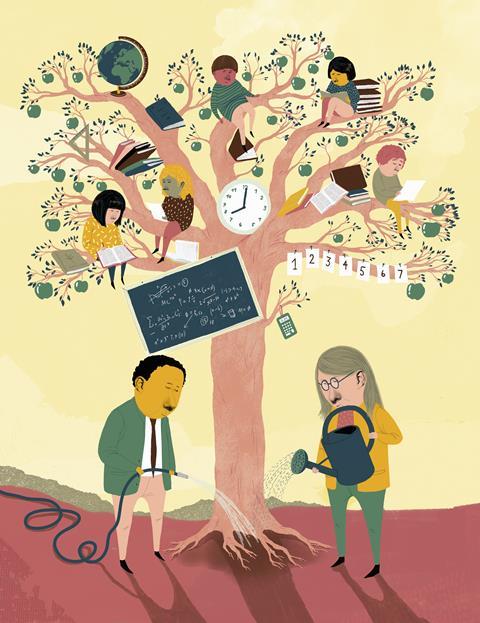The benefits and challenges of using this approach for teaching chemistry
What is enquiry-based learning?
Enquiry-based learning (EBL) requires students to search for knowledge by investigating and questioning. Put simply, it is ‘learning through doing’. A student takes an active role in learning, with some help from the teacher.

Why is it of interest?
There is some debate about the pros and cons of EBL. Its supporters argue that it fosters a high degree of scientific literacy and curiosity. Students are encouraged to think for themselves and develop research, problem-solving and reasoning skills. However, its critics say there is a danger that students will fall behind if they haven’t yet mastered the content. While it may work well in certain settings, such as after-school clubs, EBL can lead to students learning less than they would through more traditional approaches. What’s more, critics have concerns that some students may feel out of their depth and find the process stressful.
What does EBL involve?
In science education, EBL is used to mimic the ways in which professional scientists work. Students are given, or can choose, a question to research or a phenomenon to investigate. With lots of opportunities for discussion in small groups, students work out how to conduct their research and gather evidence to suggest answers and explanations.
You can encourage different levels of student autonomy by deciding how frequently to intervene. For example, teachers might want to encourage students to collaborate more by mediating group discussions. To get students thinking more critically, they could throw in some challenging questions, introduce new information, or ask for extended explanations or justifications of an opinion. It’s up to you to select the right level of activity for the intended learning objective, and to intervene when necessary.
What could EBL look like for chemistry lessons?
Teachers first select a specific topic as the stimulus. For example, you could ask students to investigate an oil spill using a model system to simulate the behaviour of oil in water. Working in small groups, students could discuss questions such as the factors that would influence the spread of oil, the ecological impacts of an oil spill and the challenges spills present to scientists and society. Or if studying polymers, for example, ask students to come up with hypotheses on the expected properties of plastic materials (density, thermal and electrical conductivity or combustibility) and then design experiments to verify them.
You can gauge the success of the teaching by observing how engaged the students are with the topic and their classmates, as well as monitoring the scientific language they use to communicate their ideas. More specifically, students can be assessed on working collaboratively, planning investigations, developing hypotheses, forming coherent arguments and scientific reasoning.
What should teachers bear in mind when adopting EBL?
The key to effective EBL is getting students to work together, whether in pairs, groups of three or of up to six. Collaboration means more than just sharing resources or allocating jobs. It allows students to express their knowledge and ideas, and then refine this information by talking and debating with peers. Through this process of challenging each other, students can collectively decide how to gather suitable data to address the set questions.
During these discussions, students also learn how to make sense of data and decide, in their group, whether their data is ‘good enough’ to be used as evidence. Students might find they’ve taken a wrong turn, and their data is not helpful. Then you may need to reassure them that blind alleys are all part of the critical thinking process. They might need to change tack and gather more or different data. Whatever happens, it’s important to allow students to continually reflect on the process, not just at the end of it.
Remember teachers should not be a passive observer and should intervene when necessary. The idea is not to dominate discussions but to allow students time to think and respond. However, you may need to keep the lesson moving forward by asking challenging questions and giving feedback where appropriate. It also helps to use collaborative and friendly language, appear engaged and acknowledge students’ efforts.
This role might not be familiar to you if you usually employ a more direct form of instruction. In these cases, professional development could help to develop these new skills and foster confidence to work in this way. Practice is also important, particularly because some teachers might struggle to take more risks and to relinquish control to their students.
Are there any costs involved?
There should be no additional costs involved, apart from the time required to inform yourself and prepare lessons. You should be able to provide EBL within any good school curriculum.
Where to go next
- The EU Framework Seventh Programme (2012–2015) funded a large project called Strategies for Assessment of Inquiry Learning in Science (SAILS). The SAILS project team collaborated with secondary science teachers who produced several assessment activities, published as free resources. They can be used as a starting point for teachers to adapt or extend where necessary.
- What is inquiry-based science? An interview from the Smithsonian Science Education Center with Robyn Gilles, professor at the School of Education at The University of Queensland, Australia.














No comments yet